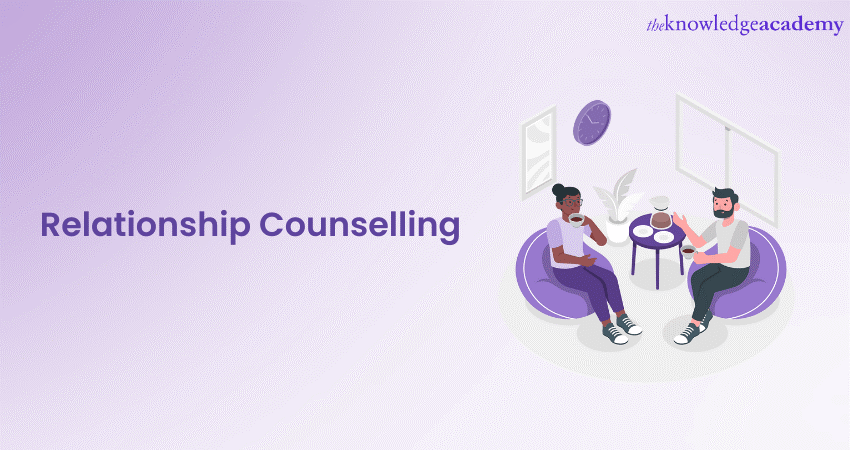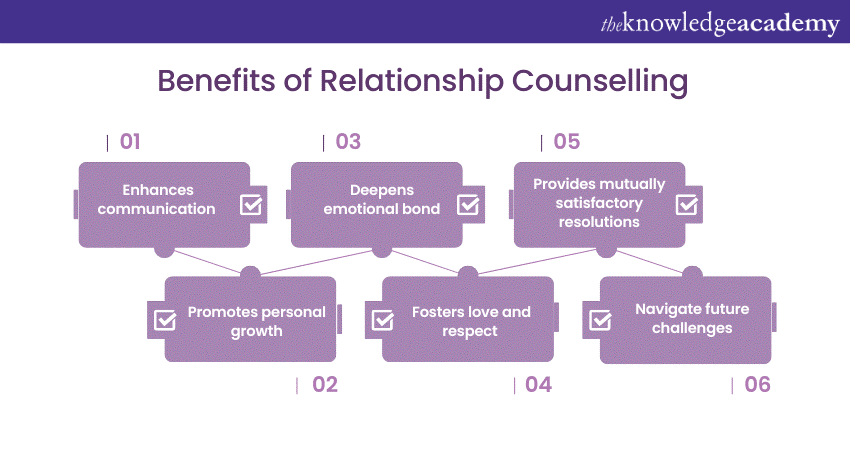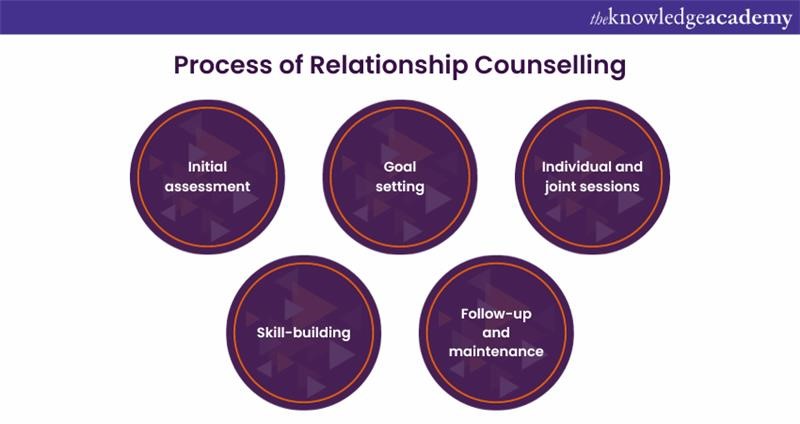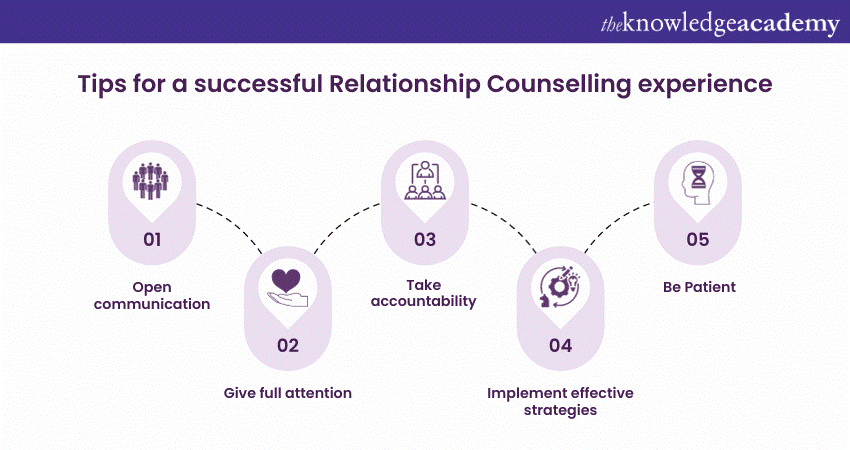We may not have the course you’re looking for. If you enquire or give us a call on 01344203999 and speak to our training experts, we may still be able to help with your training requirements.
Training Outcomes Within Your Budget!
We ensure quality, budget-alignment, and timely delivery by our expert instructors.

Relationship Counselling is a valuable resource for individuals, couples, and families seeking to enhance their Relationships. It offers guidance, tools, and a safe space to address challenges and improve communication. The first step in Relationship Counselling is the initial assessment. During this phase, the Counsellor gets to know the individual or the couple seeking Counselling.
Through this process, individuals can gain valuable insights, strengthen emotional bonds, and cultivate a more fulfilling and harmonious Relationship. That's why, for people struggling to maintain positive relationships must learn about this type of Counselling and enhance personal relationships. Want to know how its understanding can help you? In this blog, you will learn what is Relationship Counselling, its benefits, the processes involved, and some useful tips. Read further to learn more!
Table of Contents
1) What is Relationship Counselling?
2) When to seek Relationship Counselling?
3) Benefits of Relationship Counselling
4) Process of Relationship Counselling
5) Tips for a successful Relationship Counselling experience
6) How to find a Relationship Therapist?
7) Online Relationship Counselling
8) Conclusion
What is Relationship Counselling?
Relationship Counselling involves working with a trained professional to address the issues affecting your Relationship. It aims to improve communication, foster understanding, and promote healthier dynamics between partners or family members. Through open and honest discussions, you can achieve the following:
1) Explore your feelings
2) Identify patterns in your behaviour
3) Develop practical solutions
When to seek Relationship Counselling?
Maintaining positive and successful relationships can be quite challenging, given that it involves two individuals with unique backgrounds coming together to forge a shared future. Thus, before things go out of hand, it’s crucial to understand when you should take up Relation Counselling. Here's a list highlighting when to seek Counselling:
1) A sense of change in Relationship: Building a strong relationship is no easy feat, as it involves two distinct individuals merging their lives and striving to create a mutual attraction from the outset. As time passes, the circumstances under which the relationship began can change, such as job loss or the arrival of a child, introducing new challenges. Change can reveal both the best and worst aspects of our personalities. Just like Individual Counselling, Relationship Counselling should be considered when initial signs of trouble emerge.
2) Consider Relationship problems as ‘real’ problems: Couples often hesitate to seek Counselling as frequently as they should because they tend not to perceive relationship difficulties as genuine significant issues. This leads them to question the benefits of Relationship Counselling.Given that a troubled relationship can significantly impact both partners' personal and work lives, it becomes clear that one should set aside any preconceived notions about Relationship Counselling. One should seek assistance when one encounters difficulties.
Benefits of Relationship Counselling
Relationship Counselling offers numerous benefits for individuals, couples, and families. Let's explore some of its key advantages:

1) Improved communication: Relationship Counselling provides a safe and supportive environment where individuals can express their thoughts, feelings, and concerns openly. Effective communication is the foundation of a healthy relationship. Through Counselling sessions, couples and families learn how to communicate more effectively, listen actively, and understand each other's perspectives. This leads to better understanding, empathy, and connection.
2) Strengthened emotional bond: Emotional intimacy is crucial for maintaining a strong and fulfilling relationship. Relationship Counselling helps couples and families deepen their emotional connection by fostering trust, vulnerability, and empathy. The Counselling process encourages individuals to express their emotions honestly, creating a safe space for authentic communication. As a result, partners and family members develop a stronger emotional bond and feel more connected on a deeper level.
3) Conflict resolution skills: Every relationship faces conflicts and disagreements. Relationship Counselling equips individuals with effective conflict resolution strategies and techniques. Counsellors provide guidance on how to navigate conflicts in a healthy and constructive manner. They help couples and families identify underlying issues, communicate their needs and concerns, and find mutually satisfactory resolutions. Learning these skills enables individuals to resolve conflicts with respect and understanding, minimising damage to the relationship.
4) Increased self-awareness: Relationship Counselling encourages self-reflection and introspection. Through guided discussions and exercises, individuals gain insights into their own behaviours, triggers, and patterns. They develop a better understanding of how their thoughts, emotions, and actions impact the relationship. This self-awareness promotes personal growth and empowers individuals to take responsibility for their actions. It alsoenables them to make positive changes that benefit the Relationship.
5) Enhanced relationship satisfaction: Relationship Counselling aims to improve overall relationship satisfaction. Couples and families experience greater fulfilment in their relationships by addressing underlying issues and improving communication. They develop a deeper appreciation for each other, feel more supported, and enjoy a more harmonious connection. Thus, it helps individuals create a positive and nurturing environment that fosters love, respect, and happiness.
6) Tools for future challenges: Relationship Counselling provides individuals with valuable tools and skills that can be applied beyond the Counselling sessions. The strategies learned in Counselling can help couples and families navigate future challenges more effectively. These tools include active listening, effective communication, conflict-resolution techniques, and problem-solving skills. By implementing these strategies into their daily lives, individuals can sustain the positive changes achieved through Counselling and continue to strengthen their Relationships.
Process of Relationship Counselling
The process of Relationship-oriented Counselling typically involves several steps that guide individuals, couples, or families towards improving their Relationships. Let's explore the key elements of the Relationship Counselling process:

Initial assessment
The first step in Relationship Counselling is the initial assessment. During this phase, the Counsellor gets to know the individuals or the couple/family seeking Counselling. They gather information about the relationship dynamics, challenges, and goals. The assessment helps the Counsellor comprehensively understand the situation and tailor the Counselling approach accordingly.
Goal setting
After the assessment, the Counsellor works collaboratively with the individuals or the couple/family to establish clear goals for the Counselling process. This step involves identifying the specific areas of the relationship that need improvement or resolution. Setting goals provides a framework for the Counselling sessions and allows everyone involved to work towards a common objective.
Individual and joint sessions
Relationship Counselling may involve a combination of individual and joint sessions. Individual sessions provide an opportunity for each person to explore their personal experiences, emotions, and perspectives. These sessions help individuals gain insights into their own behaviours, beliefs, and patterns that may impact the Relationship.
At the same time, joint sessions bring the individuals or the couple/family together with the Counsellor to address Relationship dynamics and challenges. These sessions focus on improving communication, resolving conflicts, and fostering healthier interaction patterns. The Counsellor facilitates open and constructive dialogue, ensuring that each person feels heard and understood.
Skill-building
Relationship Counselling often involves teaching and practising specific skills to enhance relationship dynamics. Counsellors introduce effective communication techniques, active listening, empathy-building strategies, and conflict-resolution skills. The goal is to equip individuals, couples, or families with practical tools they can use to navigate challenges and maintain healthier relationships.
Follow-up and maintenance
Relationship Counselling is not a one-time event but rather an ongoing process. Counsellors may recommend follow-up sessions to assess progress, address new issues that arise, or provide additional support. Regular check-ins help individuals or couples/families maintain the positive changes achieved during Counselling and continue their growth and development.
Throughout the Counselling process, the Counsellor maintains a non-judgmental and supportive environment. They provide guidance, offer insights, and encourage self-reflection and personal responsibility. The Counsellor acts as a facilitator, helping individuals or couples/families explore their feelings, thoughts, and behaviours in a safe and confidential space.
It's important to note that the specific details and duration of the Counselling process may vary based on the needs and circumstances of the relationship. A skilled and experienced Relationship Counsellor will tailor the process to best address the concerns and goals of the individuals or the couple/family seeking Counselling.
Relationship Counselling offers a structured and guided approach to help individuals, couples, or families improve their Relationships. Moreover, it helps strengthen their connection and develop healthier interaction patterns.
Tips for a successful Relationship Counselling experience
In order to make the most of your Relationship Counselling experience and maximise its effectiveness, consider the following tips:

1) Be open and honest: Share your thoughts and feelings with the Counsellor and your partner/family.
2) Practice active listening: Give your full attention, maintain eye contact, and reflect on what you've heard.
3) Take responsibility: Acknowledge your role in the Relationship and be accountable for your actions and emotions.
4) Implement strategies: Apply the techniques and tools learned in Counselling to improve communication and conflict resolution.
5) Maintain patience and commitment: Understand that change takes time and stay dedicated to the Counselling process.
6) Support outside Counselling: Continuously communicate, appreciate, and engage in activities that strengthen your Relationship.
Note: Remember that Relationship Counselling is a collaborative effort between the Counsellor and the individuals or the couple/family seeking Counselling.
Unlock the potential for personal growth and well-being with our transformative Mental Health And Wellbeing Training – sign up today!
How to find a Relationship Therapist?
Various professionals provide Relationship Therapy, such as Clinical Psychologists, licensed Marriage and Family Therapists, accredited Counsellors, and Licensed Clinical Social Workers. It is important to note that despite the term "marriage" in their titles, Relationship Counselling can benefit individuals regardless of their marital status.
While the internet is often the initial go-to for finding a Therapist, seeking recommendations from acquaintances can be a more effective starting point. In urban areas, there is likely an abundance of qualified Therapists, making the decision process overwhelming.
It's better to make use of the free consultations that many Therapists offer to potential clients. This is an excellent opportunity to assess whether the specific Counsellor aligns with your requirements, personal style, and budget. The Therapist-client relationship can have a profound impact on your life, so choose wisely.
Online Relationship Counselling
If traditional in-person therapy is not suitable for you and your partner, online Counselling can present a viable alternative. There are several reasons why you might consider trying online therapy:
1) Geographical separation: In situations where you and your partner reside in different locations, such as long-distance relationships, online therapy services enable both partners to participate, bridging the physical gap.
2) Frequent travel: If either you or your partner frequently travel for work or have busy schedules that make in-person Counselling impractical, online options offer the flexibility to receive Counselling regardless of location or time constraints.
3) Comfort and accessibility: Some individuals may find traditional face-to-face therapy challenging, uncomfortable, or anxiety-inducing. Web-based solutions can provide a more accessible and comfortable avenue for Relationship Counselling.
Online Relationship Counselling services make use of various communication tools, including online chats, video sessions, and phone calls. It allows couples to engage in discussions with each other and their Therapist. Together with your partner, you will collaborate to establish objectives for your therapy, which may involve resolving issues related to communication and conflicts.
Conclusion
We hope that after reading this blog, you have understood everything about Relationship Counselling. It offers valuable support to improve relationships through open communication, active listening, and personal responsibility. By following the above tips, you can foster stronger connections and a more fulfilling Relationship.
Elevate your Counselling skills to new heights with our transformative Counselling Masterclass – sign up now!
Frequently Asked Questions
Upcoming Health & Safety Resources Batches & Dates
Date
 Counselling Masterclass
Counselling Masterclass
Fri 28th Jun 2024
Fri 4th Oct 2024
Fri 13th Dec 2024







 Top Rated Course
Top Rated Course



 If you wish to make any changes to your course, please
If you wish to make any changes to your course, please


